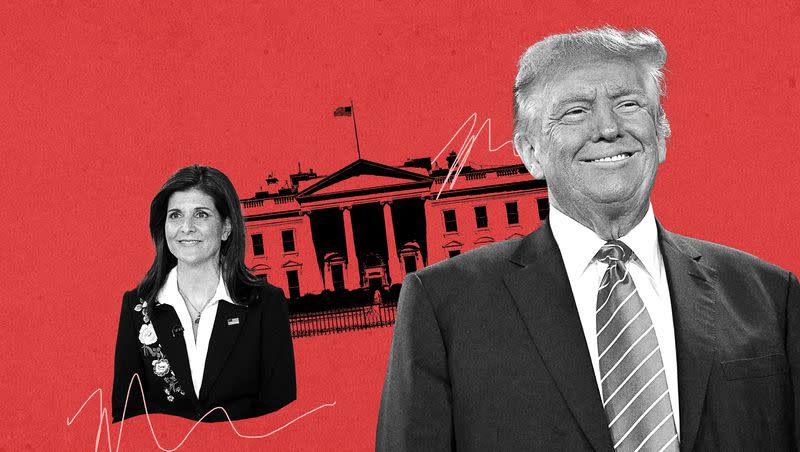Poll: Trump widens lead in Utah

- Oops!Something went wrong.Please try again later.
- Oops!Something went wrong.Please try again later.
- Oops!Something went wrong.Please try again later.
Donald Trump is increasing his lead for the Republican presidential nomination among Utah voters, a new poll suggests.
The Deseret News/Hinckley Institute of Politics poll shows that 49% of registered Utah Republicans say they’d support Trump if the presidential primary were held today. Nikki Haley finished in second place, with 22%.
Florida Gov. Ron DeSantis — who suspended his campaign on Jan. 21 — was included in the poll, earning 13%. Nearly 1 in 5 voters (17%) say they are still undecided.
The poll was conducted from Jan. 16 to 21, with a sample size of 428 Utah Republicans. The margin of error is +/- 4.74 percentage points.

Jason Perry, director of the University of Utah’s Hinckley Institute of Politics, said he expects many of DeSantis’ supporters to back Trump.
“Nationally we saw the DeSantis’ supporters move to Trump, especially after his endorsement. That will probably be the case in Utah as well,” he said. “Our poll shows most of DeSantis’ supporters were very and somewhat conservative, a group more likely to move to Trump. Nikki Haley has courted moderate voters, making it more difficult for her to pick up supporters when more conservative candidates have dropped out.”
After decisive victories in the Iowa caucuses and the New Hampshire primary, former President Trump is the favorite to win the Republican nomination. But Haley, the former South Carolina governor and Trump’s ambassador to the United Nations, has vowed to remain in the race through Super Tuesday, when Republicans in Utah and 14 other states will cast their votes.
According to a report from The Dispatch on Thursday, a committeeman for the Republican National Committee proposed a draft resolution to declare Trump the party’s presumptive nominee, effectively circumventing primary elections in states across the country. Earlier in the week, RNC chairwoman Ronna McDaniel called on Haley to drop out, saying the party must “unite around our eventual nominee.”
But the resolution was withdrawn shortly after Trump disavowed the strategy, saying he wanted to be named the party’s nominee “at the ballot box.”
“While I greatly appreciate the Republican National Committee (RNC) wanting to make me their PRESUMPTIVE NOMINEE, and while they have far more votes than necessary to do it, I feel, for the sake of PARTY UNITY, that they should NOT go forward with this plan, but that I should do it the ‘Old Fashioned’ way, and finish the process off AT THE BALLOT BOX,” Trump wrote on Truth Social.
In Utah, Trump has seen a steady rise in polling since last spring. In March 2023, before DeSantis announced his candidacy, the Florida governor led Trump in polls of Utah voters. But by late May, Trump was the favorite, and he has maintained a lead since: 26% in May, 33% in September, 49% now.
Haley polled in single digits until September, when she reached 11%. By November, she entered a statistical tie with DeSantis.
Instead of a primary election, Utah will hold a caucus with a “presidential preference poll,” as the party did in 2016. Registered Republican voters are encouraged to attend a caucus site on Tuesday, March 5, to cast their vote, though the party has said absentee voting will be an option. Candidates on the ballot will include Trump, Haley and Ryan Binkley, a pastor and businessman from Texas. State party chair Rob Axson said he is undergoing a “confirmation process” with other candidates who have since dropped out — like DeSantis, Vivek Ramaswamy and Chris Christie — before removing their names from the ballot.
“We don’t want to remove anyone from the ballot without them telling us to do so,” Axson said.
Axson has emphasized that a caucus incentivizes candidates to campaign in the state. “I have invited and encouraged these candidates to engage with Utahns and visit our state in the lead-up to our caucus and thereafter,” Axson said. But candidates have focused almost exclusively on early-voting states — Iowa, New Hampshire and South Carolina — while no Republican candidate has campaigned in Utah since July of last year, when DeSantis visited the state.
Other candidates — including Haley, Tim Scott and Mike Pence — attended the E2 Summit in Park City in October, but none held public events.
“For me, I would’ve liked to see a primary, and engage more voters,” said Sen. Mike McKell, a member of Haley’s Utah leadership team. “But for me, I think (Haley’s) chances are just as good in a presidential preference poll as in a primary.”
Haley is tentatively planning a visit to Utah on Feb. 8, two days after the Nevada primary, where she may speak at the Gary Herbert Institute at Utah Valley University, according to Ally Isom, a member of Haley’s Utah leadership team. The Haley campaign did not respond to the Deseret News’ request to confirm the Utah visit.
“Momentum is growing,” Isom said. “She has gone from being unknown and unrecognized to being one of the last two people in the race.”

